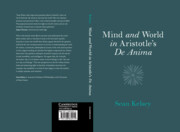Book contents
Conclusion
from Part III - Proposals
Published online by Cambridge University Press: 16 December 2021
Summary
This book has looked at some familiar doctrines from a different perspective. The doctrines were that sensibility is a kind of mean and that intelligence is something single, separate, unmixed; the perspective was to see these doctrines as filling out Aristotle’s explanation of why it is in human nature to perceive and to understand beings. The core of that explanation is that sensibility and intelligence are “forms” or “measures” of their respective objects, perceptible and intelligible beings; to see the doctrines just alluded to as “filling out” this core is to see them as specifying those forms or measures (in the one case as a kind of mean, in the other as something simple, separate, or unmixed). The upshot is that there is a kind of priority of sensibility and intelligence to perceptible and intelligible beings. Some will find this upshot un-Aristotelian: doesn’t he hold that perceptible and intelligible beings are causes of and (therefore) prior to perceptual and intellectual knowledge? In this concluding chapter then I try to meet this and similar concerns, by way of clarifying the perspective I have been developing.
- Type
- Chapter
- Information
- Mind and World in Aristotle's De Anima , pp. 159 - 164Publisher: Cambridge University PressPrint publication year: 2021



